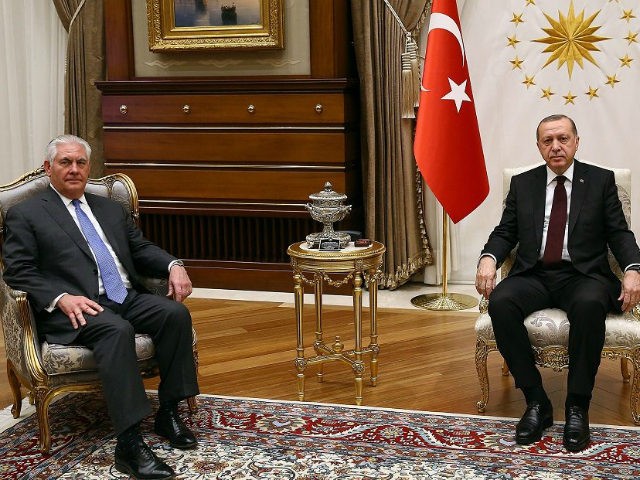Secretary of State Rex Tillerson engaged in a “productive, open conversation” with Turkish President Recep Tayyip Erdogan Thursday night, State Department officials said, engaging for more than three hours on growing disagreements over Erdogan’s decision to invade Syria.
Tillerson arrived after visits to Jordan and Lebanon this week on Thursday evening and nearly immediately entered the extensive meeting with Erdogan. Turkish outlets reported that Erdogan “clearly” demanded of Tillerson that the United States cease opposing Turkey’s presence in northern Syria and supporting Syrian Kurdish fighters in the region. Anadolu Agency, the Turkish state news outlet, reported that the two “discussed several issues, including bilateral ties and regional developments, particularly Syria and Iraq.”
CNN notes that Tillerson did not bring an American translator into the meeting with him, instead relying on Turkish Foreign Minister Mevlut Cavusoglu to translate.
Turkey and the United States issued a joint statement following Tillerson’s meeting with Erdogan affirming “their mutual and unequivocal commitment to each other’s security and defense.” The statement also announces the debut of an unspecified “results-oriented mechanism” to resolve “outstanding issues” between the two countries, which will become active “no later than mid-March.”
The largest-looming “outstanding issue” between the countries is Ankara’s threat that it is open to attacking U.S. troops in Syria.
The Turkish government launched “Operation Olive Branch,” an invasion of northwestern Syria’s Afrin region, in late January with the intention of killing all members of the Syrian Kurdish People’s Protection Units (YPG/YPJ), a U.S.-allied militia largely responsible for the defeat of the Islamic State (ISIS) in that country.
Ankara claims the YPG is indistinguishable from the U.S.-designated terrorist group, the Kurdistan Workers’ Party (PKK), which seeks to establish a sovereign Kurdish state carved out of Turkish, Syrian, Iraqi, and Iranian territory. The U.S. has objected to Turkey’s invasion, calling it a distraction from the overall fight against ISIS.
Afrin lies in Rojava, or Syrian Kurdistan. Erdogan has repeatedly stated his intention to push the Turkish military past Afrin, where there is no U.S. troop presence, into Manbij to the east, where the United States is stationed, giving aid to the Syrian Defense Forces (SDF), an umbrella group largely consisting of YPG fighters. Erdogan has also threatened Idlib, south of Afrin, home to a raging battle between Sunni rebel groups and the Shiite-led government of dictator Bashar al-Assad.
On Tuesday, echoing warnings from his officials that the Turkish military may attack American forces, Erdogan threatened U.S. troops with “the Ottoman slap,” a medieval martial arts technique. The State Department refused to acknowledge the comment.
In their joint statement Friday that omits the YPG, the two countries also condemned a list of terrorist organizations. “Turkey and the United States reiterate their resolve to fight against DAESH, PKK, Al Qaeda, and all other terrorist organizations and their extensions,” it reads.
The statement notably also includes a statement by Washington condemning “the heinous coup attempt” against Erdogan in July 2016. The Turkish government has repeatedly accused the CIA, the FBI, and other American officials of orchestrating the failed coup. Many speculate the Erdogan staged the coup attempt himself to amass power.
Following his meeting with Erdogan, Tillerson met with Cavusoglu alone to hash out more details. The two also held a joint press conference, where Cavusoglu insisted that the United States must cease all cooperation with the YPG. “We have to be sure the YPG will withdraw to the east of the Euphrates. The YPG has to leave Manbij first. This is already a U.S. promise to Turkey,” he said, according to Turkey’s Hurriyet newspaper.
While tensions regarding Operation Olive Branch center largely around Manbij, civilians in Afrin have told a variety of media outlets that the Turkish offensive has forced them largely into hiding. An estimated hundreds of thousands in Afrin “are hiding from bombs and airstrikes in caves and basements, trapped in the Kurdish enclave while Turkey and its allies are bogged down in fierce ground battles against formidable opponents,” Voice of America reports.
The YPG, no longer able to rely on the United States, has turned to Assad for help. While YPG officials have not demanded Assad intervene, they have made the argument that, if Damascus does not recognize the sovereignty of Kurdistan, it has a duty to expel Turkey from Rojava.
Iran’s state-run PressTV reported Friday that Assad is ready to heed that call, “reportedly set to deploy troops to the northern district of Afrin.” The YPG and Syrian army have largely avoided each other during the Civil War; the YPG has concentrated on fighting the Islamic State, while Assad has focused on attacking Sunni Arab civilians.

COMMENTS
Please let us know if you're having issues with commenting.